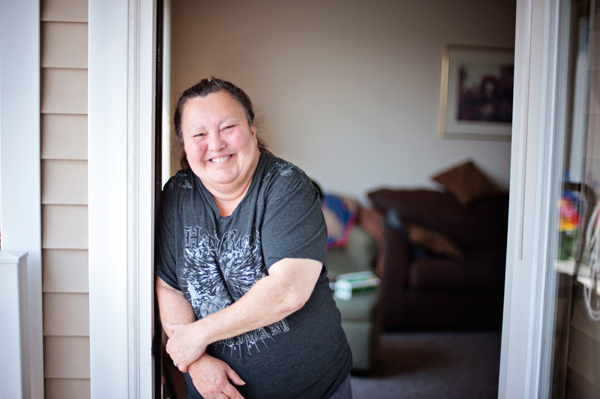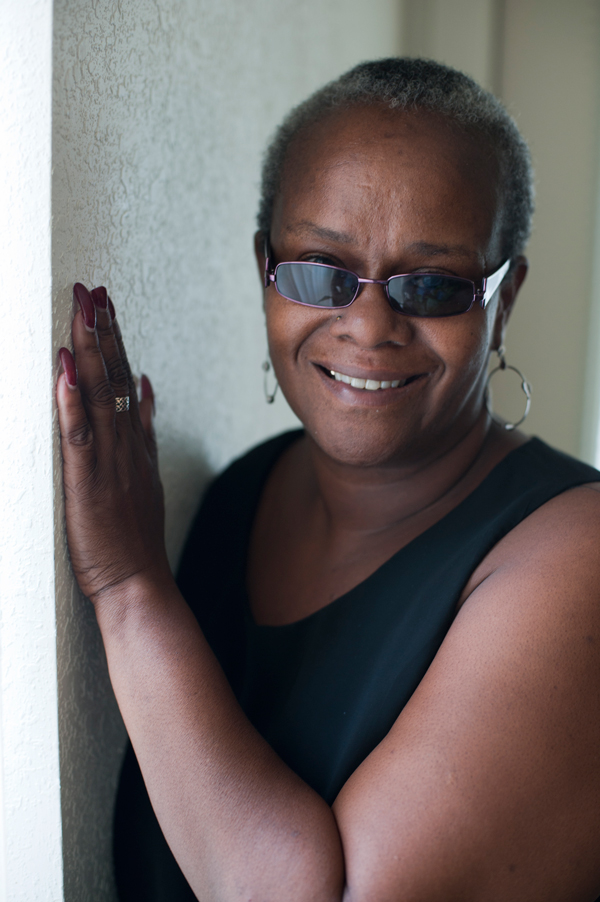Silver Star, medal of gallantry, is also a place vets call home
Homelessness can happen to anyone and it happens too often to American military veterans. Zinta Aistars talks with vets who have moved from unstable homelessness to security at the Silver Star Apartments in Battle Creek.
If there is one thing that those who have experienced homelessness can attest to having in common, it is the sense of being invisible to the rest of the world. According to the Michigan State Homeless Management Information System (HMIS), Michigan has a homeless population of approximately 86,000 people. About three percent of the homeless in Michigan are veterans. Approximately 1,800 homeless people live in Calhoun County, and nearly 360 of them are veterans.
For some veterans, returning “home” from military service has meant living in the streets. They joined the ranks of the invisible.
At Silver Star Apartments, an apartment complex located at 44 N. Clark Road in Battle Creek, alongside the Veterans Affairs Hospital, the homeless veterans have become visible again, and along with their visibility, they have found a place that will take them off the streets. They’ve found home.
“Homelessness is too uncomfortable. People don’t want to see it or think about it. But it can happen to anyone.” That’s Michael Carter speaking, and he knows. Carter is a veteran, and for three years of his life, he was homeless–until he came to Silver Star. Once he felt solid ground beneath him again, he saw an opportunity and acted on it.
“Management here is great, but they needed a liaison between management and the veterans,” Carter says. “So I suggested my position here, and now,” he smiles and opens the door to a small office just inside the front entrance of the building, “here I am, every day.”
Carter is the supportive housing specialist at Silver Star, and that means he does something of everything. Most of all, he listens. And he understands. He’s been there, he’s taken the fall, and he has gotten up again.
Seated inside his office, however, are four veterans to whom he listens closely, but whose journey he may not entirely understand. They are four women. The bond between Samantha Roeder, Deborah Helbig, Brenda Parrott and Wanda Murrell is immediately apparent. The women sit close, and as they speak, they often reach out to each other. If someone needs a hug, there it is.
“This is home,” Murrell says. “I’m not leaving here until they take me out ten toes up.”
They all nod empathetically.
“There’s maybe six or seven women here,” Murrell continues. “Out of 75 apartments. We stick together. I don’t trust easy. The last place where I lived, someone tried to come in through the window. Here, I live on the first floor, and I don’t worry.”
It wasn’t always that way, she says. When Silver Star first opened in 2009, the complex had a bad reputation. “Drugs, alcohol, prostitution.” Murrell shrugs. But that all changed, and the women give great credit to Mike Carter, the man in the middle who understands and listens.
Murrell served as a finance specialist in the Army. She cites the list of her troubles since her service like a laundry list of stains that won’t come clean: a diagnosis of post-traumatic stress disorder (PTSD), a brutal rape, divorce and a broken family, an addiction to crack cocaine, rehabilitation dotted with relapses, and a pattern of homelessness.
She dangles a long key chain of colorful icons she’s earned for staying clean. By the time her journey brought her to Silver Star, the complex had cleaned up its act and so had she.
Brenda Parrott served in the Army, too. She and Murrell give each other a quick nod. “I was raped while I was in the service,” she says. “When I reported it, I got laughed at. I had a compassionate colonel, and he gave me an honorable discharge. You know, commanders can throw out any complaint, and that’s what they do. Women can serve, but it’s still a good old boys club.”
One by one, the women veterans add each their own similar story. Along with their cloak of invisibility among the homeless, all four women have worn that same cloak as rape survivors. All show the still sometimes raw wounds of recovery, whether from PTSD or other mental illness, and from substance abuse. All cite broken families, divorces, multiple marriages, and losing custody of their children.
“I lost custody of my three children,” Parrott says, “but I’m 25 years sober now.” Tears flood her eyes, and the other women hand her a tissue. “I became homeless after my 56th birthday, but in September 2012, I moved to Silver Star, and it felt like home right away. This has been the calmest year of my life.”
This place these veterans call home is currently under expansion. The 75 units will soon be joined by another 100. Silver Star is the first Low Income Housing Tax Credit development in Michigan to provide permanent supportive housing to homeless veterans. It was developed by the Michigan State Housing Development Authority (MSHDA) in partnership with a for-profit developer, the Veteran’s Administration, the Veteran’s Hospital, and local service agencies. Medallion Management assists in placing the veterans at Silver Star, and the Family Home Health Services provide the supportive housing services coordinators such as Michael Carter.
“When we opened in 2009,” says Carter, “we were only one of three in the country that offered housing to homeless veterans. Now we give tours to agencies and people wanting to do something similar.”
The one-bedroom units are approximately 700 square feet, are furnished and include a package of household supplies to help residents start a new life.
Deborah Helbig served in the Air Force, where she met her then husband. She speaks of “many bad decisions,” of PTSD and bipolar disorder, marriages ending in widowhood and two more in divorce, followed by years of drug use.
“I wouldn’t want to be anyplace else,” she says of Silver Star. “At some point the light came on: I’m a veteran.” Meaning, she had resources available to her. After losing her job and exhausting her savings, free-basing crack cocaine to bury her pain, “at some point you have to stop and get hold of your problems.”
Samantha Roeder served in the Navy, working in damage control. “It was a lot like being a firefighter. I maintained equipment on the ship. There were only three other women in the engineering department aboard ship. You had to learn to walk a fine line in working with the men. You had to be careful not to use shampoo with fragrance because of the effect it might have on the men.”
Like the others, Roeder survived rape during her service, and the scars led eventually to a broken marriage. “I was depressed, I was worn down to a nub. My husband took tough assignments in the military, and he was gone all the time. I ended up in a psychiatric hospital. But you know, I truly believe that everything we go through brings us to where we need to be.”
Michael Carter listens to the women share their stories. Then he says, quietly: “Everybody has a story, but what we share here is that we all know what it means to lose home. Now we are here, all in the process of rediscovering ourselves. If you’ve suffered through trauma, just to know you have a roof over your head, a safe place …” He takes a breath. “Sometimes that’s enough.”
The only requirements to live at Silver Star, Carter says, is that one must be a homeless veteran. Income limit for a new resident is $18,600. “Once you live here, you can make as much as you like, you can stay forever. Rent can be as little as $4 a month, or a maximum of $537. When Silver Star first opened, only seven residents were making an income. Today, only four residents do not have an income at all. It’s turned us all around.”
To learn more about Silver Star Apartments or to arrange a tour, call Michael Carter at 269.964.6000.
Zinta Aistars is creative director for Z Word, LLC, and editor of the literary magazine, The Smoking Poet. She lives on a farm in Hopkins.
Photos by Erik Holladay.




















